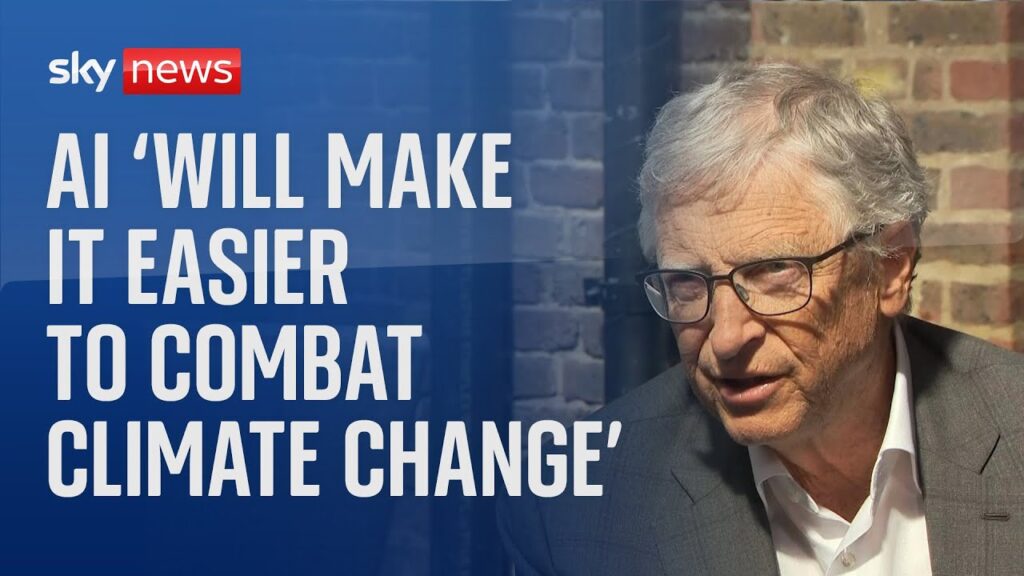Bill Gates insists artificial intelligence (AI) will aid in achieving climate goals, despite concerns that increased data centers will put unprecedented strains on green energy supplies. The Microsoft co-founder, 68, argued that AI could help countries reduce energy use by improving technology and electricity grid efficiency. He told journalists, “Let’s not go overboard on this. Data centers are, in the most extreme case, a 6 percent addition (in energy demand), but probably only 2 percent to 2.5 percent. The question is, will AI accelerate a more than 6 percent reduction? And the answer is: certainly.”
Goldman Sachs estimates one AI query via ChatGPT requires nearly ten times more electricity than a Google search, potentially doubling carbon emissions from data centers between 2022 and 2030. Some experts suggest AI data centers could drive a 10 percent increase in electricity demand in developed countries, reversing years of efficiency gains. At a London conference hosted by Breakthrough Energy – Gates’ venture fund – he emphasized tech companies are investing in green electricity to meet the added demand from AI data centers. He added, “The tech companies are the ones willing to pay a premium, and to help bootstrap green energy capacity.”
Breakthrough Energy has invested in more than 100 energy transition companies. Gates, through the Gates Foundation, also significantly invests in AI, with Microsoft – the largest external investor in OpenAI – integrating AI tools into its Windows OS under the Copilot brand. Research supports Gates’ optimism on the future of AI data center energy use. A Nature Scientific Reports paper found generative AI emits significantly less CO2 for simple tasks than humans. And Google used DeepMind’s technology to cut its data center cooling bill by 40 percent in 2016, reducing electricity needs for non-IT tasks by 15 percent.
But Microsoft’s emissions reports indicate rising “scope three” emissions due to global data center construction, which currently cannot rely on renewable electricity. Gates cautioned that despite advances, the world might miss its 2050 climate targets by up to 15 years, as green electricity development lags. He said, “I worry, in general, that the amount of green electricity that we need for the transition is not going to show up nearly as fast as we need. We’re not going to get to zero by 2050, I don’t think.” Gates’ warning follows a global report indicating that despite record renewable energy growth in 2023, fossil fuel consumption also hit a new high due to rising demand.
Gates’ comments highlight the broader issue of balancing the benefits and drawbacks of AI in the context of energy consumption and climate change. While the energy requirements of AI are significant, the potential for AI to drive efficiency and innovation in energy use presents a compelling case for its role in achieving climate goals. AI’s ability to optimize electricity grids, enhance renewable energy integration, and reduce waste is a crucial aspect of its contribution to sustainability.
The tech industry’s investment in green energy is a positive step toward mitigating the environmental impact of data centers. Companies like Microsoft and Google are leading the way in adopting renewable energy sources to power their operations. This not only helps reduce their carbon footprint but also stimulates the growth of the renewable energy market, making it more accessible and affordable for other sectors.
However, the transition to green energy is not happening fast enough to meet the growing demand. The development of renewable energy infrastructure must accelerate to keep pace with the expansion of AI and other energy-intensive technologies. Policymakers, industry leaders, and researchers must collaborate to address the technical and economic challenges of scaling up renewable energy production and distribution.
Gates’ cautionary note about potentially missing the 2050 climate targets by up to 15 years underscores the urgency of this issue. Despite the rapid advancements in renewable energy technology, the current rate of development is insufficient to meet global climate goals. This highlights the need for increased investment, innovation, and policy support to drive the transition to a sustainable energy future.
AI’s role in this transition extends beyond optimizing current energy systems. It can also play a crucial role in developing new materials and technologies for renewable energy, improving energy storage solutions, and enhancing energy efficiency across various industries. The integration of AI in these areas can accelerate the shift toward a more sustainable and resilient energy infrastructure.
Moreover, AI can contribute to climate goals by enabling more effective monitoring and management of environmental resources. AI-powered systems can track emissions, monitor deforestation, and optimize agricultural practices to reduce their environmental impact. These applications demonstrate the potential for AI to support broader sustainability efforts beyond energy efficiency.
While the increased energy consumption of AI technologies presents significant challenges, their potential to drive efficiency and innovation in energy use offers a promising pathway to achieving climate goals. Bill Gates’ insights emphasize the importance of leveraging AI to optimize energy systems and accelerate the transition to renewable energy. The continued investment in green energy, combined with the strategic application of AI, will be essential in overcoming the obstacles to a sustainable energy future. By balancing the benefits and drawbacks of AI, society can harness its potential to support a greener, more resilient world.
If you like the article please follow on THE UBJ.
